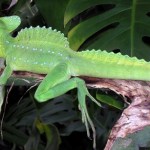Life Sciences
David Klinghoffer is promising to deliver some revisionism over at the Discovery Institute:
Starting tomorrow, I would like to devote a couple posts to the thesis that Communism has deeper Darwinian roots than many of us realize. That, in fact, even though Marx had already begun sketching the outlines of his ideas before Darwin published the Origin of Species — the Communist Manifesto appeared in 1848, the Origin in 1859 — he is fairly called a Darwinist. That, finally, the men who translated Marxism into practical political terms in the form of Soviet terror were evolutionary thinkers, just…
If, so far, you've been finding Mr Darwin's book tough going (it's OK, there's no shame in admitting it), here's what you should do: skip all that flannel about variation, and start here. This is where it gets serious.
Chapter 3 of the Origin, as its opening pages explain, faces in two directions. In chapters one and two, we've established the fact of variation, and the fluidity of living forms -- both in space, as shown by the blurry boundaries between species, and in time, as shown by the effect of artificial selection on domestic species. In the chapter to come, says Darwin, we'll be…
Primate Culture Is Just A Stone's Throw Away From Human Evolution, Study Finds:
For 30 years, scientists have been studying stone-handling behavior in several troops of Japanese macaques to catch a unique glimpse of primate culture. By watching these monkeys acquire and maintain behavioral traditions from generation to generation, the scientists have gained insight into the cultural evolution of humans.
New Evidence That Humans Make Aspirin's Active Principle -- Salicylic Acid:
Scientists in the United Kingdom are reporting new evidence that humans can make their own salicylic acid (SA) --…
There just haven't been enough squamates around here lately (well, apart from the anguids). Because I have guilt, here is a good photo of a beautiful animal: a Plumed basilisk Basiliscus plumifrons. Thanks to their striking appearance, basilisks are often featured in books and on TV, but people only ever say the same two things about them: (1) that they have striking display structures like those so obvious here, and (2) that they can run (bipedally) across the surface of water. Yeah yeah, I've heard all that before - tell me something new, puh-lease!
I have to admit that I can't: all the…
Mosquitoes Create Harmonic Love Song Before Mating, Study Finds:
That pesky buzz of a nearby mosquito is the sound of love, scientists have known for some time. But a new Cornell study reports that males and females flap their wings and change their tune to create a harmonic duet just before mating.
How Did Life Begin? RNA That Replicates Itself Indefinitely Developed For First Time:
One of the most enduring questions is how life could have begun on Earth. Molecules that can make copies of themselves are thought to be crucial to understanding this process as they provide the basis for…
Man, this guy didn't know anything.
I don't mean that as an insult. Darwin, as he admits, knew almost nothing about inheritance, about how variation is produced, or about the origins and history of domesticated plants and animals. You'd think that would be a handicap in using domestication as an analogy for evolution.
And yet, in chapter 1 of the Origin, 'Variation Under Domestication', Darwin uses what little knowledge he has so deftly that nowhere do you feel his conclusions are outstripping his data. This, believe me, is quite a skill, both in a scientist and a writer. What, he asks, is…
Last year the blogosphere and global media went nuts over the 'Montauk monster'. A small mammal corpse that washed up on the beach at Long Island, New York, it was not an alien, government experiment, or sea-monster, as widely claimed by idiots worldwide, but - without doubt - a dead, rotten raccoon. This month a vaguely similar sort of thing is happening, though this time there is less hype. And, for me, the corpse is closer to home, having been discovered on Croyde Beach in Devon, southern England [its skull is shown at left]. The Croyde carcass made several national newspapers, including…
Chris Elliot (Philosophy, Hofstra) has made me aware that Project Gutenberg has doubled its coverage of works by Thomas Henry Huxley. Some light reading on this weekend for those not watching the NFL. The additions are:
Conditions of Existence as Affecting the Perpetuation of Living Beings
Coral and Coral Reefs
Criticism on "The origin of species"
Evidence as to Man's Place in Nature
Geological Contemporaneity and Persistent Types of Life
Method By Which the Causes of the Present and Past Conditions of Organic Nature Are to Be Discovered -- the Origination of…
Among the small thrills of encountering canonical works for the first time - Homer, say, or the King James Bible, or Star Wars - are the moments when you come across some turn of phrase so well-used it has been worn flat into the surface of everyday speech and think: so that's where that comes from. I'm thinking that the same might be true of the Origin, but in a different way.
For example, what's the first living thing that Darwin names? Turns out it's "the woodpecker, with its feet, tail, beak and tongue so admirably adapted to catch insects under the bark of trees".
This got me thinking…
As part of ongoing follow up on my story in this week's New York Times Magazine, I've been posting about a Department of Justice document leaked to me with the wording of their proposal to ban all non-canine service animals. Yesterday I posted the DOJ's rationale behind the species ban. I've since gotten several emails asking whether the leaked DOJ documents contained language banning the use of psychiatric service animals as well. It doesn't. Here, below the jump, is the DOJ's new proposed service animal definition:
"The Department's final rule defines "service animal" as "any dog that…
This one's a little of the beaten path for this site, since it's not physics or even anything I normally follow as a hobby. But along with science and many other things I'm a bit of a firearms enthusiast, and since guns are closely connected with hunting it probably wasn't unlikely that I'd come across this Livescience piece about the genetic implications of hunting.
The thesis is so simple as to be almost self-evident. Hunters tent to hunt for the largest and most impressive animals, especially when hunting seasons are short and bag limits are small.
This unnatural selection, a practice…
Hi! My name is John. I've got a PhD in evolutionary biology, and I've spent much of the past decade writing about evolutionary ideas, as applied to everything from literary criticism, to language, to anti-terror policy, and even on occasion to biology. And I've got a confession - I've never read the Origin of Species.
Do I shock you? Good.
I am not proud of this (really, I'm not), but if my professional life has been less stellar than it might have been, it's not for want of reading Darwin. Here's why. Darwin was working at the dawn of biology. He had none of the specialist knowledge and…
Hi! My name is John. I've got a PhD in evolutionary biology, and I've spent much of the past decade writing about evolutionary ideas, as applied to everything from literary criticism, to language, to anti-terror policy, and even on occasion to biology. And I've got a confession - I've never read the Origin of Species.
Do I shock you? Good.
I am not proud of this (really, I'm not), but if my professional life has been less stellar than it might have been, it's not for want of reading Darwin. Here's why. Darwin was working at the dawn of biology. He had none of the specialist knowledge and…
There are 10 new articles in PLoS ONE today. As always, you should rate the articles, post notes and comments and send trackbacks when you blog about the papers. You can now also easily place articles on various social services (CiteULike, Connotea, Stumbleupon, Facebook and Digg) with just one click. Here are my own picks for the week - you go and look for your own favourites:
Resurrection of a Bull by Cloning from Organs Frozen without Cryoprotectant in a â80°C Freezer for a Decade:
Frozen animal tissues without cryoprotectant have been thought to be inappropriate for use as a nuclear…
Birgit Schlick-Steiner, of the University of Innsbruck in Austria, has funding for a Ph.D. student to work on the molecular ecology of the Tetramorium caespitum complex. This research group has produced some top-notch science in recent years, and if you are looking to become a professional myrmecologist this is an excellent opportunity. You'd receive training in some of the most current techniques at the interface of genetics, ecology, and taxonomy. The full announcement is below the fold.
MOLECULAR ECOLOGY, INSTITUTE OF ECOLOGY, UNIVERSITY OF INNSBRUCK
PhD position
The…
Odontomachus meinerti trap-jaw ant, Argentina
One perk of being at a research university is the opportunity to shoot the various study organisms on campus. These subjects are interesting- they have to be, or they wouldn't be studied- and when the research goes public I get the chance to disseminate my photographs with the science media outlets that cover the story.
Among my favorite campus animals is the Odontomachus trap-jaw ant, one of the focal taxa in Andy Suarez's lab. The researchers are looking at the biomechanics of the jaw, one of the fastest recorded appendages among…
Seriously, when I read the headlines to this article, I wanted to wretch retch. (Ed. I need to learn how to spell.)
Scientists discover true love
Scientists: True love can last a lifetime
I can feel it welling up now...eh...OK, I feel better.
Just to be clear, I didn't want to wretch retch because I am a deeply cynical person who scoffs at the notion of true love. (That is true, but not why I wanted to wretch retch.) I wanted to wretch retch because scientific research like this inevitably results in the worst kind of popular tripe when communicated in journalism. We are talking the most…
tags: Birds in the News, BirdNews, ornithology, birds, avian, newsletter
Rainbow Lory, Trichoglossus haematodus moluccanus. This subspecies of rainbow lory is also found in Australia, along the east coast.
Image: John Del Rio. [larger view].
Birds in Science
One of the most contentious issues among scientists who study the evolution of birds is identifying precisely when the modern birds (Neornithes) first appeared. This is due to conflicts between the fossil record and molecular dating methodologies. For example, fossils support a Tertiary radiation whereas molecular dating methodologies…
There are 9 new articles in PLoS ONE today. As always, you should rate the articles, post notes and comments and send trackbacks when you blog about the papers. You can now also easily place articles on various social services (CiteULike, Connotea, Stumbleupon, Facebook and Digg) with just one click. Here are my own picks for the week - you go and look for your own favourites:
Population Dynamics Constrain the Cooperative Evolution of Cross-Feeding:
Cross-feeding is the exchange of nutrients among species of microbes. It has two potential evolutionary origins, one as an exchange of…
The mosquito Aedes aegypti sucks the blood of people from all over the tropics, and exchanges it for the virus that causes dengue fever - a disease that afflicts 40 million people every year. The mosquito has proven to be a tough adversary and efforts to drive it from urban settings have generally failed in the long-term. So how do you fight such an accomplished parasite? Simple - use a better parasite. In fact, try the most successful one in the world, a bacterium called Wolbachia.
Wolbachia's success rests on two traits. First, it targets the most diverse group of animals on the planet,…


